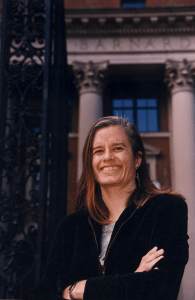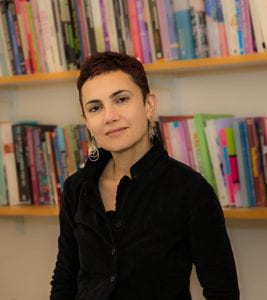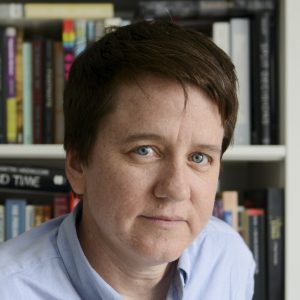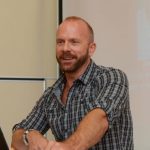Each year SPAN invites a distinguished scholar from another university to spend several days at Northwestern as Visiting Professor.
Due to the COVID-19 pandemic, SPAN has not hosted visiting professors from 2020-2022.
By Year: 2022-23 | 2018-19 | 2017-18 | 2016-17 | 2015-16 | 2014-15 | 2013-14 | 2011-12 | 2010-11
2022-23 Visiting Professor: Janet Jakobsen
Janet R. Jakobsen is Claire Tow Professor of Women’s Gender and Sexuality Studies and Co-Director of the Center for Research on Women at Barnard College, Columbia University. Jakobsen’s most recent book is The Sex Obsession: Perversity and Possibility in American Politics, a 2021 Finalist for the Lambda Literary Award in LGBTQ Studies. She was the founding editor of the webjournal Scholar & Feminist Online and has taught as a Visiting Professor at Wesleyan University and Harvard University. Before entering the academy, she was a policy analyst and organizer in Washington, D.C.
Prof. Jakobsen’s visit coincided with our workshop “Political Reaction: How Sexuality Studies Matters to the Struggle for Social Justice.” Jakobsen delivered the keynote address at the workshop.
2018-19 Visiting Professor: Jyoti Puri
Jyoti Puri is Professor of Sociology at Simmons University. She writes and teaches at the crossroads of sociology, postcolonial feminist theory, and sexuality/queer studies. She has recently published, Sexual States: Governance and the Struggle over the Antisodomy Law in India (Duke University Press 2016). Her previous books include,Woman, Body, Desire in Post-colonial India (Routledge 1999) and Encountering Nationalism, (Blackwell Publishers 2004). She is currently working on a project on death and migration.
Prof. Puri’s visit coincided with our workshop “Sexual ReVisions: Sexualities Through a Transnational Lens.” Puri delivered the keynote address at the workshop.
2017-18 Visiting Professor: Heather Love
Heather Love is Associate Professor of English at the University of Pennsylvania. She is the author of Feeling Backward: Loss and the Politics of Queer History (Harvard), the editor of a special issue of GLQ on Gayle Rubin (“Rethinking Sex”), and the co-editor of a special issue of Representations (“Description across Disciplines”). She is currently completing a book on practices of description in the humanities and social sciences after World War II.
Prof. Love’s visit coincided with our workshop on “Sexual Truths and Post-Truths.” Love delivered the keynote address at the workshop.
2016-17 Visiting Professor: Kane Race
Kane Race is Associate Professor of Gender and Cultural Studies at the University of Sydney. His work has explored embodied engagements with medicine across various different contexts and cultures of consumption: HIV; sexual practice; drug use (both licit and illicit); and markets in bottled water. He is the author of Pleasure Consuming Medicine: the queer politics of drugs (Duke UP, 2009) and Plastic Water: the social and material life of bottled water (with Gay Hawkins and Emily Potter, MIT Press, 2016). His book The Gay Science: intimate experiments with the problem of HIV is forthcoming from Routledge in 2017.
Prof. Race’s visit coincided with our workshop on “Stigma.” Race delivered the keynote address at the workshop.
2015-16 Visiting Professor: Gayle Rubin

Gayle Rubin is an associate professor of anthropology and women’s studies at the University of Michigan. She is a cultural anthropologist best known as an activist and theorist of sex and gender politics. She has written on a range of subjects including feminism, lesbian and gay history, and urban geographies of sexual subcultures. Deviations, a collection of her essays, was published in 2011 by Duke University Press.
Prof. Rubin’s visit coincided with our workshop on “Whereabouts.” Rubin delivered the keynote address at the workshop.
2014-15 Visiting Professor: Jafari Allen
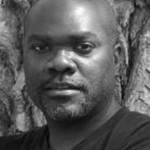
Jafari S Allen is Associate Professor of African American Studies and Anthropology. Professor Allen works at the intersections of (queer) sexuality, gender and blackness. A recipient of fellowships from the National Science Foundation, Social Science Research Council Sexuality Research Program, and Rockefeller Foundation (Diasporic Racisms Project); he teaches courses on the cultural politics of race, sexuality and gender in Black diasporas; Black feminist and queer theory; critical cultural studies; ethnographic methodology and writing; subjectivity, consciousness and resistance; Cuba and the Caribbean. Dr. Allen is the author of the critical ethnography, ¡Venceremos?: The Erotics of Black Self-Making in Cuba (Perverse Modernities series of Duke University Press, Fall 2011), and editor of Black/Queer/Diaspora – a special issue of GLQ: A Journal of Lesbian and Gay Studies. His work can also be found in, for example: American Ethnologist (Volume 39 Number 2); GLQ: A Journal of Lesbian and Gay Studies; Souls: A Critical Journal of Black Politics, Culture, and Society; Identities: Global Studies in Culture and Power; Handbook of Sexuality, Health and Human Rights, edited by Richard Parker and Peter Aggleton, and a number of other publications. Allen is also the author of the introduction– “Crucial Palimpsest: Re-Reading Brother to Brother”– to the Redbone Press edition of Brother to Brother: New Writings By Black Gay Men, originally edited and introduced by Essex Hemphill and conceived by Joseph Beam.
Prof. Allen’s visit coincided with our workshop on “Remapping the Erotic.” Allen delivered the keynote address at the workshop.
2013-14 Visiting Professor: Anne Fausto-Sterling
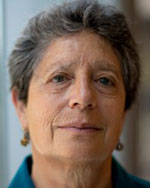
Anne Fausto-Sterling has achieved recognition for works that challenge entrenched scientific beliefs while engaging with the general public. She is the author of three acclaimed books that are referenced widely in feminist and scientific inquiry, as well as scientific publications in developmental genetics and developmental biology. Dr. Fausto-Sterling is currently focused on applying dynamic systems theory to the study of human development. Her ambition is to restructure dichotomous conversations—inside the academy, in public discourse, and ultimately in the framing of social policy—in order to enable an understanding of the inseparability of nature/nurture. She asserts that Dynamic Systems Theory permits us to understand how cultural difference becomes bodily difference. Fausto- Sterling’s current case studies in this area examines the emergence of gender differences in behavior in early childhood. Dr. Fausto-Sterling is a frequent commentator and reference for journalists in some of the world’s leading media outlets, such as The New York Times and PBS. She has spoken widely throughout the United States and abroad about topics within her realm of expertise and has considerable experience as a workshop leader on college campuses interested in integrating the insights of feminist scholarship into science curriculum. In addition to having served on the Brown faculty for over 40 years, Dr. Fausto- Sterling has been a visiting professor at a number of institutions in the US and abroad in departments of Biology, Medical Science, Gender Studies and Science Studies. She is a Fellow of the American Association for the Advancement of Science, and has received grants and fellowships in both the sciences and the humanities.
Prof. Fausto-Sterling’s visit coincided with our workshop on “Desiring Categories.” Fausto-Sterling delivered the keynote address at the workshop.
2011-12 Visiting Professor: Richard G. Parker
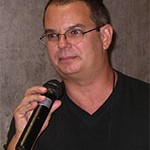
Richard Parker is Professor of Sociomedical Sciences and Anthropology and a member of the Committee on Global Thought at Columbia University in New York City, where he also directs the Center for the Study of Culture, Politics and Public Health in the Department of Sociomedical Sciences of the Mailman School of Public Health. He is also the Director and President of the Brazilian Interdisciplinary AIDS Association (ABIA), one of the leading non-governmental AIDS organizations in Brazil, as well as the founder and current Co-Chair of Sexuality Policy Watch, a global coalition of researchers, policymakers and activists. Dr. Parker received his PhD in Anthropology from the University of California, Berkeley, in 1988. His research has focused on the social and cultural construction of gender and sexuality, the social aspects of HIV and AIDS, and the relationship between social inequality, health and disease. Dr. Parker’s recent books include Sexuality, Health and Human Rights (2008), Bodies, Pleasures and Passions: Sexual Culture in Contemporary Brazil, 2nd ed. (2010), and the Handbook on Sexuality, Health and Rights (2010). Dr. Parker is the founding Editor-in-Chief for the journal, Global Public Health. He is also a Founding Editor of the journal, Culture, Health and Sexuality, and a founding member of the Editorial Board for the journal, Health and Human Rights.
Prof. Parker’s visit coincided with our workshop on “Libidinal Investments.” Parker delivered the keynote address at the workshop and also served on a panel on publishing in sexuality studies.
2010-11 Visiting Professor: Joanne Meyerowitz
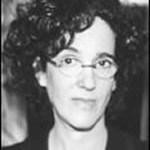
Eminent historian of sexuality Joanne Meyerowitz (Professor of History and American Studies at Yale) served as our inaugural Visiting Professor, April 27-29, 2011. Prof. Meyerowitz received her Ph.D. from Stanford University. She taught at Indiana University, where she edited the Journal of American History, the leading scholarly journal in U.S. history, and subsequently was on the faculty at the University of Cincinnati. In 2004, she moved to Yale University where she is Professor of History and American Studies and co-director of the Yale Research Initiative on the History of Sexualities.
Professor Meyerowitz has a lengthy publication list but is perhaps best known for her pathbreaking book How Sex Changed: A History of Transsexuality in the United States, which was published by Harvard University Press in 2002. An influential work of social and cultural history, How Sex Changed takes a fine-grained attention to the particularities of representations of sex, gender, and sexuality in medical, scientific, mass media, artistic, activist, and popular discourses and uses it to advance a powerful argument about the place of transgender in the historical constitution of our understandings of sex and gender.
More recently, Meyerowitz has published such essays as “Transnational Sex and U.S. History” in the American Historical Review in 2009; “‘How Common Culture Shapes the Separate Lives’: Sexuality, Race, and Mid-Twentieth-Century Social Constructionist Thought” in the Journal of American History in 2010; and “Thinking Sex with an Androgyne,” in GLQ in 2011. Prof. Meyerowitz is also the recipient of numerous awards from institutions such as the Guggenheim Foundation, the American Council of Learned Societies, and the Social Science Research Council.
Prof. Meyerowitz’s visit coincided with our workshop on “Epistemologies of Desire.” Meyerowitz delivered the keynote address at the workshop and also presented other material as a speaker on one of the workshop panels.
In addition, Prof. Meyerowitz met with our Gender & Sexuality Instructors’ Group to discuss Yale’s teaching in the area of sexuality studies and to provide feedback on our own plans to broaden the sexuality studies curriculum. She also met individually with a number of faculty members and graduate students, who were invited to sign up for appointments with her.

